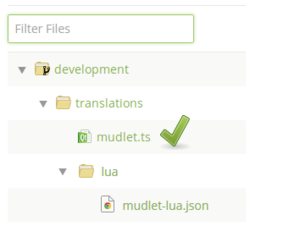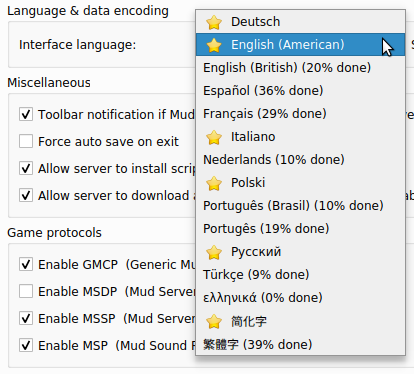Translating Mudlet
Thanks for helping translate Mudlet to your language! Mudlet is a free, open-source project and helping it speak your language means a lot to us. :)
How to start?
- Go to Mudlet on Crowdin
- Select the language you'd like to translate.
- Log in
- Select development - translations - mudlet.ts
- Start translating!
What happens then?
Since Mudlet version 3.14 it is now possible to run Mudlet with the new translations. Your translations are regularly collected as preparation to use as soon as a new Mudlet version gets ready for release. This way, we can continuously improve Mudlet with more and more languages available.
How to get a gold star?
Translating a language above 95% will earn it a gold star.
Suggested settings in Crowdin
- In options, hide html code, so it will display shortened as <1> and </1> for example.
- Click Context to always display information on where the current string is used exactly. Sometimes you can even see screenshots here for comparison.
Other translations needed?
Below the file mentioned above, you can find more content from Mudlet website and wiki. For example, international users want to read new release notes or documentation for specific Mudlet functionality, at best in their own language.
English (American) translation
This is a special case that is handled internally as the CrowdIn system does not allow for one target locale to only contain the plural form when the remainder of the source texts are in the required language already. The translation file thus consists only of translations that contain a numerus (quantity-dependent) translation where the source text varies depending on a quantity, e.g. "You have just destroyed %n room(s)...!". In English this means that there are two plural forms one for the single (one room) case and the other for all other quantities (many or no rooms). For this example text it would require the two translations "You have just destroyed a room...!" and "You have just destroyed %n rooms...!".
N.B. Others language have other variations (for instance French uses an additional "s" for the zero case, as well as the more than one, one; on the other hand Japanese has only one form for all quantities, in comparison Russian has a more complex systems with three variations, see Translation Rules for Plurals for the details).
For the developer who is in the root of the source code, (ensure you are using the latest version you can of the following Qt utilities):
lupdate -pluralonly ./src/ -ts ./translations/translated/mudlet_en_US.tswill ensure the translation file is up to date {unfortunately, versions prior to Qt 5.12.2 will be unhappy about C++11 raw string literals}, the-recursiveoption is not needed as it is the default.linguist ./translations/translated/mudlet_en_US.tswill allow editing the translation for this locale.- the resulting file will then be converted into the binary
./translations/translated/mudlet_en_US.qmfile to be included into the main Mudlet resources along with the other translations when the project is next compiled.
How to coordinate?
A simple chat functionality exists in Crowdin: You can comment on each text seperately. This way, you can also give feedback to Mudlet developers.
However, if you want to coordinate more thoroughly, please feel free to join us on Discord or in Mudlet's international forum. Doing that, you can easily establish a more permanent contact with other translators and continue from there.

